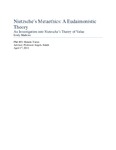| dc.rights.license | In Copyright | en_US |
| dc.creator | Mathews, Emily Taylor | |
| dc.date.accessioned | 2011-08-17T14:38:11Z | |
| dc.date.created | 2011 | |
| dc.identifier | WLURG38_Mathews_PHIL_2011 | |
| dc.identifier.uri | http://hdl.handle.net/11021/22882 | |
| dc.description | Thesis; [FULL-TEXT FREELY AVAILABLE ONLINE] | en_US |
| dc.description | Emily Taylor Mathews is a member of the Class of 2011 of Washington and Lee University. | en_US |
| dc.description.abstract | In this paper, I will first outline how modern philosophers typically make the distinction between non-moral and moral value. The rest of the paper will be divided into three parts: first Brian Leiter's interpretation of Nietzsche's theory of non-moral good, second Leiter's and Thomas Hurka's interpretations of Nietzsche's theory of moral good, and third my interpretation of Nietzsche's theory of value. In Part I, I will first explain the parallel that Brian Leiter draws between Nietzsche's theory of non-moral value and Peter Railton's objective realist theory of non-moral goodness, and outline some of what Nietzsche says in his work that supports this theory of value. In Part II, I will provide a brief overview of different Metaethical views, explain Nietzsche's "will to power" argument, and outline how Leiter and Thomas Hurka interpret the "will to power" doctrine and Nietzsche's theory of moral value. In the last part of my thesis, Part III, I will argue for a different interpretation of Nietzsche's theory of value. I will first explain what seems to be Nietzsche's ultimate aim in his writing, for us to flourish as human beings through the progress of society . I will argue that it is this ultimate aim that drives Nietzsche's theory of value. I will outline what Nietzsche's realist eudaimonistic theory of value will look like, and then I will explain what I believe Nietzsche would say constitutes flourishing for "higher" types and "lower" types. I will conclude that Nietzsche can be interpreted as a moral realist, but in a eudaimonistic sense. [From the Introduction] | en_US |
| dc.description.statementofresponsibility | Emily Mathews | |
| dc.format.extent | 49 pages | en_US |
| dc.language.iso | en_US | en_US |
| dc.rights | This material is made available for use in research, teaching, and private study, pursuant to U.S. Copyright law. The user assumes full responsibility for any use of the materials, including but not limited to, infringement of copyright and publication rights of reproduced materials. Any materials used should be fully credited with the source. | en_US |
| dc.rights.uri | http://rightsstatements.org/vocab/InC/1.0/ | en_US |
| dc.subject.other | Washington and Lee University -- Honors in Philosophy | en_US |
| dc.title | Nietzsche's Metaethics: A Eudaimonistic Theory, An Investigation into Nietzsche's Theory of Value (thesis) | en_US |
| dc.type | Text | en_US |
| dcterms.isPartOf | RG38 - Student Papers | |
| dc.rights.holder | Mathews, Emily Taylor | |
| dc.subject.fast | Nietzsche, Friedrich Wilhelm, 1844-1900 | en_US |
| dc.subject.fast | Metaethics | en_US |
| dc.subject.fast | Moral realism | en_US |
| dc.subject.fast | Self-realization -- Moral and ethical aspects | en_US |
| local.department | Philosophy | en_US |
| local.scholarshiptype | Honors Thesis | en_US |
